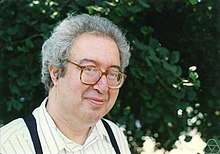Robert M. Solovay

Robert Solovay 1983
| Robert M. Solovay | |
|---|---|
| Born |
December 15, 1938 Brooklyn, New York, U.S. |
| Nationality | American |
| Alma mater | University of Chicago |
| Awards | Paris Kanellakis Award (2003) |
| Scientific career | |
| Fields | Mathematics |
| Institutions | University of California, Berkeley |
| Doctoral advisor | Saunders Mac Lane |
| Doctoral students |
Matthew Foreman Judith Roitman W. Hugh Woodin |
Robert Martin Solovay (born December 15, 1938) is an American mathematician specializing in set theory.
Biography
Solovay earned his Ph.D. from the University of Chicago in 1964 under the direction of Saunders Mac Lane, with a dissertation on A Functorial Form of the Differentiable Riemann–Roch theorem.[1] Solovay has spent his career at the University of California at Berkeley, where his Ph.D. students include W. Hugh Woodin and Matthew Foreman.[2]
Work
Solovay's theorems include:
- Solovay's theorem showing that, if one assumes the existence of an inaccessible cardinal, then the statement "every set of real numbers is Lebesgue measurable" is consistent with ZF without the axiom of choice;
- Isolating the notion of 0#;
- Proving that the existence of a real valued measurable cardinal is equiconsistent with the existence of a measurable cardinal;
- Proving that if is a strong limit singular cardinal, greater than a strongly compact cardinal then holds;
- Proving that if is an uncountable regular cardinal, and is a stationary set, then can be decomposed into the union of disjoint stationary sets;
- With Stanley Tennenbaum, developing the method of iterated forcing and showing the consistency of Suslin's hypothesis.
- Outside of set theory, developing (with Volker Strassen) the Solovay–Strassen primality test, used to identify large natural numbers that are prime with high probability. This method has had implications for cryptography.
- With T. P. Baker, J. Gill, proved that relativizing arguments cannot prove .[3]
- Proving that GL (the normal modal logic which has the instances of the schema as additional axioms) completely axiomatizes the logic of the provability predicate of Peano Arithmetic.
- With Alexei Kitaev, proving that a finite set of quantum gates can efficiently approximate an arbitrary unitary operator on one qubit.
Selected publications
- Solovay, Robert M. (1970). "A model of set-theory in which every set of reals is Lebesgue measurable". Annals of Mathematics. Second Series. 92 (1): 1–56. doi:10.2307/1970696.
- Solovay, Robert M. (1967). "A nonconstructible Δ13 set of integers". Transactions of the American Mathematical Society. American Mathematical Society. 127 (1): 50–75. doi:10.2307/1994631. JSTOR 1994631.
- Solovay, Robert M. and Volker Strassen (1977). "A fast Monte-Carlo test for primality". SIAM Journal on Computing. 6 (1): 84–85. doi:10.1137/0206006.
See also
References
- ↑ Robert M. Solovay at the Mathematics Genealogy Project
- ↑ https://math.berkeley.edu/people/faculty/robert-m-solovay
- ↑ "Relativizations of the P=?NP question over the reals (and other ordered rings)". Theoretical Computer Science. 133 (1): 15–22. 1994-10-10. doi:10.1016/0304-3975(94)00068-9. ISSN 0304-3975.
External links
- Robert M. Solovay at the Mathematics Genealogy Project
- Robert Solovay at DBLP Bibliography Server

This article is issued from
Wikipedia.
The text is licensed under Creative Commons - Attribution - Sharealike.
Additional terms may apply for the media files.